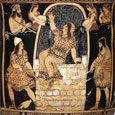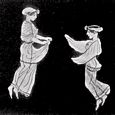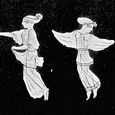NEPHELAI
Greek Name
Νεφελη Νεφελαι
Transliteration
Nephelê, Nephelai
Roman Name
Nebula, Nubes
Translation
Cloud (nephelê)
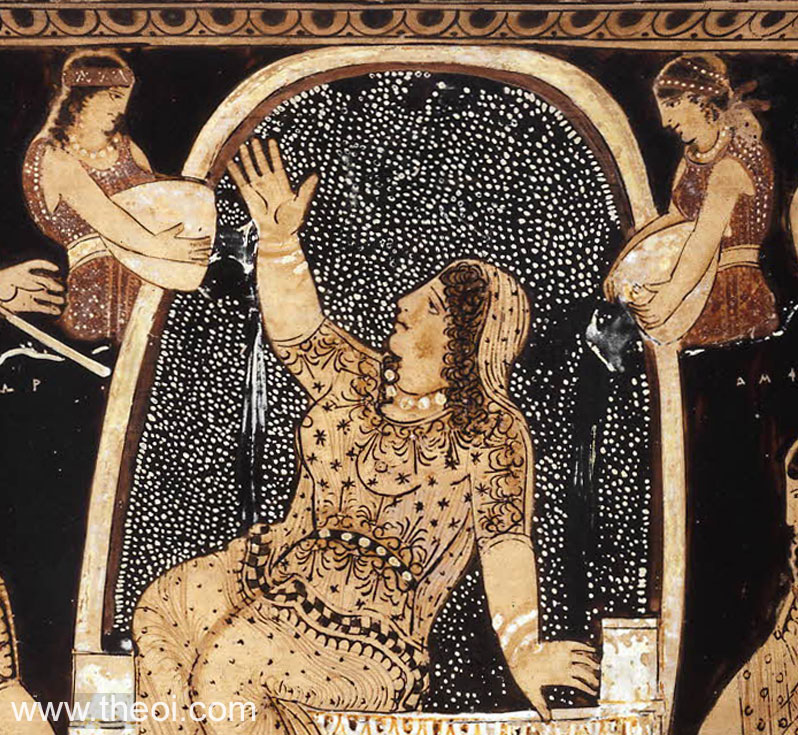
THE NEPHELAI (Nephelae) were the Okeanid-nymphs of clouds and rain. They arose from the earth-encircling river Okeanos (Oceanus) bearing water in cloudy pitchers. Nephelai fed the streams of their River-God brothers with rain and nourished the earth.
They were depicted as beautiful, young women pouring water from pitchers--like their Naiad sisters--or as women flitting across the sky in billowing robes.
FAMILY OF THE NEPHELAE
PARENTS
[1.1] OKEANOS (Homeric Hymn 2.5,
Aristophanes Clouds 264)
[1.2] TETHYS (Orphic Hymn 22)
[2.2] AITHER (Aristophanes Clouds 563)
CLASSICAL LITERATURE QUOTES
NEPHELAE NYMPHS OF THE CLOUDS
Aeschylus, Prometheus Bound 115 - 285 (trans. Weir Smyth) (Greek tragedy C5th B.C.)
:
"[In the following passage Aeschylus apparently imagines the Okeanides (Oceanids) as clouds gathering
around the peak of Mount Kaukasos (Caucasus):]
Prometheus [who has just been chained to the mountain crag] : Ha! Behold! What murmur, what scent wings to me,
its source invisible, heavenly or human, or both? Has someone come to this crag at the edge of the world to
stare at my sufferings--or with what motive? . . . What may be this rustling stir of birds I hear again nearby?
The air whirs with the light rush of wings. Whatever approaches causes me alarm.
[The Okeanides (Oceanids) enter on a winged car, probably representing the clouds.]
Chorus [of Okeanides] : Do not fear! For our group has come in swift rivalry of wings to this crag as friend to
you, having won our father's consent as best we might. The swift-coursing breezes (aurai) bore me on;
for the reverberation of the clang of iron pierced the depths of our caves and drove my grave modesty away in
fright; unsandalled I have hastened in a winged car.
Prometheus : Alas! Alas! Offspring of fruitful (polyteknos) Tethys and of him who with his sleepless
current encircles the whole earth, children of your father Okeanos (Oceanus), behold, see with what fetters,
upon the summit crag of this ravine, I am to hold my unenviable watch
Chorus [of Okeanides] : I see, Prometheus; and over my eyes a mist of tears and fear spread as I saw your body
withering ignominiously upon this rock in these bonds of adamant. For there are new rulers in heaven, and Zeus
governs with lawless customs; that which was mighty before he now brings to nothing . . . Who of the gods is so
hard of heart as to exult in this? Who does not sympathize with your woes--save only Zeus? But he in malice, has
set his soul inflexibly and keeps in subjection the race [the Titanes] sprung from Ouranos (Uranus); nor will he
stop, until he has satiated his soul or another seizes his impregnable empire by some device of guile . . . You
are bold, and do not yield to your bitter pangs; you give too much license to your tongue. But my soul is
agitated by piercing fear, and I am in dread about your fate, wondering to what haven you must steer your ship
to see an end of your voyage of sorrow. For the heart of Kronos' (Cronus') son [Zeus] is hardened against
entreaty and his ways are inexorable . . .
Chorus [of Okeanides] : Not to unwilling ears have you made this appeal, Prometheus. And so now with light foot
I will quit my swift-speeding seat and the pure air (aithêr), the pathway of birds and draw near
to this rugged ground; for I want to hear the whole story of your sorrows."
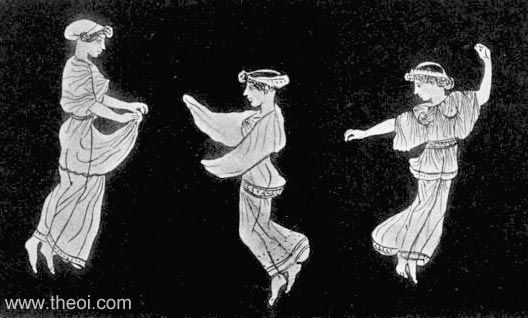
Aeschylus, Prometheus Bound 399 ff :
"Chorus [of Okeanides] : I mourn your unfortunate fate, Prometheus. Shedding from my eyes a coursing flood
of tears I wet my tender cheeks with their moist streams. For Zeus, holding this unenviable power by
self-appointed laws, displays towards the gods of old an overweening spirit. Now the whole earth cries aloud in
lamentation."
[N.B. The tears of the Okeanides probably represent rain.]
Aeschylus, Prometheus Bound 528 ff :
"Chorus [of Okeanides]: Nor may I be slow to approach the gods, with holy sacrifices of oxen slain, by the
side of the ceaseless stream of Okeanos, my father; and may I not offend [Zeus] in speech; but may this rule
abide in my heart and never fade away."
Aeschylus, Prometheus Bound 1054 ff :
"Hermes : Such indeed are the thoughts and the words [of Prometheus] one hears from men deranged . . . But,
at all events, may you [the Okeanides] who sympathize with his anguish, withdraw in haste from this spot so that
the relentless roar of the thunder [from Zeus] does not stun your senses.
Chorus [of Okeanides] : Use some other strain and urge me to some other course in which you are likely to
convince me. This utterance in your flood of speech is, I think, past all endurance. How do you charge me to
practise baseness? With him I am content to suffer any fate; for I have learned to detest traitors, and there is
no pest I abhor more than this.
[As the thunder begins to roar, the Okeanides heed the warning and depart.]"
Aristophanes, Clouds 264 ff (trans. O'Neill) (Greek comedy C5th to 4th B.C.)
:
"[In Aristophanes' comedy the Clouds, Sokrates (Socrates) declares that the Nephelai (Clouds) are
the greatest of the gods :]
Sokrates (Socrates) : Give heed to the prayers. (In an hierophantic tone) Oh! most mighty king, the boundless
Aer (Air), that keepest the earth suspended in space, thou bright Aither (Aether, Upper Air) and ye venerable
goddesses, the Nephelai (Nephelae, Clouds), who carry in your loins the thunder and the lightning, arise, ye
sovereign powers and manifest yourselves in the celestial spheres to the eyes of your sage . . .
Come, oh! Nephelai (Clouds), whom I adore, come and show yourselves to this man, whether you be resting on the
sacred summits of Olympos, crowned with hoar-frost, or tarrying in the gardens of Okeanos (Oceanus), your
father, forming sacred Choruses with the Nymphai (Nymphs); whether you be gathering the waves of the Neilos
(Nile) in golden vases or dwelling in the Maiotic marsh or on the snowy rocks of Mimas, hearken to my prayer and
accept my offering. May these sacrifices be pleasing to you.
(Amidst rumblings of thunder the Chorus of Nephelai (Clouds) appears.)
Chorus [of Nephelai] (singing) : Eternal Nephelai (Clouds), let us appear; let us arise from the roaring depths
of Okeanos (Oceanus), our father; let us fly towards the lofty mountains, spread our damp wings over their
forest-laden summits, whence we will dominate the distant valleys, the harvest fed by the sacred earth, the
murmur of the divine streams and the resounding waves of the sea, which the unwearying orb lights up with its
glittering beams. But let us shake off the rainy fogs, which hide our immortal beauty and sweep the earth from
afar with our gaze.
Sokrates : Oh, venerated goddesses, yes, you are answering my call! (To Stresoades.) Did you hear their voices
mingling with the awful growling of the thunder?
Strepsiades : Oh! adorable Nephelai (Clouds), I revere you and I too am going to let off my thunder, so greatly
has your own affrighted me. (He farts.) Faith! whether permitted or not, I must, I must crap!
Sokrates : No scoffing; do not copy those damned comic poets. Come, silence! a numerous host of goddesses
approaches with songs.
Chorus [of Nephelai] (singing ): Virgins, who pour forth the rains, let us move toward Attika (Attica), the rich
country of Pallas, the home of the brave; let us visit the dear land of Kekrops (Cecrops), where the secret
rites are celebrated, where the mysterious sanctuary [of Demeter] flies open to the initiate . . . What victims
are offered there to the deities of heaven! What glorious temples! What statues! What holy prayers to the rulers
of Olympos! At every season nothing but sacred festivals, garlanded victims, is to be seen. Then spring brings
round again the joyous feasts of Bromios [Dionysos], the harmonious contests of the Choruses and the serious
melodies of the flute.
Strepsiades : By Zeus! Tell me, Sokrates, I pray you, who are these women, whose language is so solemn; can they
be demi-goddesses?
Sokrates : Not at all. They are the Nephelai (Clouds) of heaven, great goddesses for the lazy; to them we owe
all, thoughts, speeches, trickery, roguery, boasting, lies, sagacity. [N.B. He probably has the more abstract
Okeanides--such as Metis, Peitho, Klymene, etc.--in mind.]
Strepsiades : Ah! that was why, as I listened to them, my mind spread out its wings; it burns to babble about
trifles, to maintain worthless arguments, to voice its petty reasons, to contradict, to tease some opponent. But
are they not going to show themselves? I should like to see them, were it possible.
Sokrates : Well, look this way in the direction of Parnes; I already see those who are slowly descending.
Strepsiades : But where, where? Show them to me.
Sokrates : They are advancing in a throng, following an oblique path across the dales and thickets.
Strepsiades : Strange! I can see nothing.
Sokrates : There, close to the entrance.
Strepsiades : Hardly, if at all, can I distinguish them.
Sokrates : You must see them clearly now, unless your eyes are filled with gum as thick as pumpkins.
Strepsiades : Aye, undoubtedly! Oh! the venerable goddesses! Why, they fill up the entire stage.
Sokrates : And you did not know, you never suspected, that they were goddesses?
Strepsiades : No, indeed; I thought the Nephelai (Clouds) were only fog, dew and vapour.
Sokrates : But what you certainly do not know is that they are the support of a crowd of quacks, the diviners,
who were sent to Thurion (Thurium), the notorious physicians, the well-combed fops, who load their fingers with
rings down to the nails, and the braggarts, who write dithyrambic verses, all these are idlers whom the Clouds
provide a living for, because they sing them in their verses.
Strepsiades : It is then for this that they praise ‘the rapid flight of the moist clouds, which veil the
brightness of day’ and ‘the waving locks of the hundred-headed Typho [Typhoeus]’ and
‘the impetuous tempests, which float through the heavens, like birds of prey with aerial wings loaded with
mists’ and ‘the rains, the dew, which the clouds outpour.’ As a reward for these fine phrases
they bolt well-grown, tasty mullet and delicate thrushes.
Sokrates : Yes, thanks to these. And is it not right and meet?
Strepsiades : Tell me then why, if these really are the Nephelai (Clouds), they so very much resemble mortals.
This is not their usual form.
Sokrates : What are they like then?
Strepsiades : I don't know exactly; well, they are like great packs of wool, but not like women-no, not in the
least . . . And these have noses.
Sokrates : Answer my questions.
Strepsiades : Willingly! Go on, I am listening.
Sokrates : Have you not sometimes seen clouds in the sky like a kentauros (centaur), a leopard, a wolf or a
bull?
Strepsiades : Why, certainly I have, but what of that?
Sokrates : They take what metamorphosis they like. If they see a debauchee with long flowing locks and hairy as
a beast, like the son of Xenophantes, they take the form of a Kentauros (Centaur) in derision of his shameful
passion. [N.B. The Kentauroi (Centaurs) were sons of the cloud-nymphe Nephele.]
Strepsiades : And when they see Simon, that thiever of public money, what do they do then?
Sokrates : To picture him to the life, they turn at once into wolves.
Strepsiades : So that was why yesterday, when they saw Kleonymos (Cleonymus), who cast away his buckler because
he is the veriest poltroon amongst men, they changed into deer.
Sokrates : And to-day they have seen Klisthenes (Clisthenes); you see . . . they are women
Strepsiades : Hail, sovereign goddesses, and if ever you have let your celestial voice be heard by mortal ears,
speak to me, oh! speak to me, ye all-powerful queens.
Chorus-Leader [of the Nephelai] : Hail! veteran of the ancient times, you who burn to instruct yourself in fine
language. And you, great high-priest of subtle nonsense, tell us; your desire. To you and Prodikos (Prodicus)
alone of all the hollow orationers of to-day have we lent an ear-to Prodikos, because of his knowledge and his
great wisdom, and to you, because you walk with head erect, a confident look, barefooted, resigned to everything
and proud of our protection.
Strepsiade s: Oh! Earth! What august utterances! how sacred! how wondrous!"
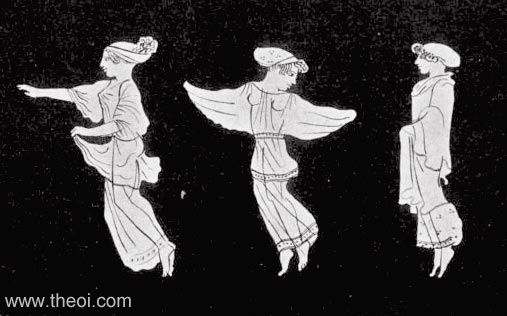
Aristophanes, Clouds 563 ff :
"First Semi-Chorus [of Nephelai] (singing) : Oh, ruler of Olympos, all-powerful king of the gods, great
Zeus, it is thou whom I first invoke; protect this Chorus; and thou too, Poseidon, whose dread trident upheaves
at the will of thy anger both the bowels of the earth and the salty waves of the ocean. I invoke my illustrious
father, the divine Aither (Aether), the universal sustainer of life, and Phoibos (Phoebus) [Helios the Sun],
who, from the summit of his chariot, sets the world aflame with his dazzling rays, Phoibos, a mighty deity
amongst the gods and adored amongst mortals . . .
Second Semi-Chorus [of Nephelai] (singing) : Aid me also, Phoibos [Apollon], god of Delos, who reignest on the
cragged peaks of Kynthia (Cynthia); and thou, happy virgin [Artemis], to whom the Lydian damsels offer pompous
sacrifice in a temple; of gold; and thou, goddess of our country, Athene, armed with the aigis, the protectress
of Athens; and thou, who, surrounded by the Bakkhantes (Bacchantes) of Delphoi (Delphi); roamest over the rocks
of Parnassos shaking the flame of thy resinous torch, thou, Bakkhos (Bacchus) [Dionysos], the god of revel and
joy."
Aristophanes, Clouds 1115 ff :
"Leader of the Chorus [of Nephelai] : In spring, when you wish to give your fields the first dressing, we
will rain upon you first; the others shall wait. Then we will watch over your corn and over your vinestocks;
they will have no excess to fear, neither of heat nor of wet. But if a mortal dares to insult the goddesses
Nephelai (Clouds), let him think of the ills we shall pour upon him. For him neither wine nor any harvest at
all! Our terrible slings will
mow down his young olive plants and his vines. If he is making bricks, it will rain, and our round hailstones
will break the tiles of his roof. If he himself marries or any of his relations or friends, we shall cause rain
to fall the whole night long."
Orphic Hymn 21 to the Nephelae (trans. Taylor) (Greek hymns C3rd B.C. to 2nd A.D.)
:
"To the Nephelai (Nephelae, Clouds), Fumigation from Myrrh. Aerial Nephelai, through heavens resplendent
plains who wander, parents of prolific rains; who nourish fruits, whose watery frames are hurled, by winds
impetuous round mighty world. Loud-sounding, lion-roaring, flashing fire, in air’s wide bosom bearing
thunders dire: impelled by each sonorous stormy gale, with rapid course along the skies ye sail. With gentle
gales your watery frames I call, on mother earth (gaia) with fruitful showers to fall."
Orphic Hymn 22 to Thalassa :
"[Tethys-Thalassa] mother of Kypris (Cypris) [Aphrodite], and of Nephelai (Nephelae, Clouds) obscure, great
nurse of beasts, and source of fountains [Naiades] pure."
Cicero, De Natura Deorum 3. 20 (trans. Rackham) (Roman rhetorician C1st B.C.)
:
"If the Arcus [i.e. Iris the rainbow] is a divinity, what will you do about the Nubes (Clouds) [Nephelai]?
The rainbow itself is caused by some coloration of the clouds; and also a Nubes (Cloud) [Nephele] is fabled to
have given birth to the Centauri (Centaurs). If you enrol the Nubes (Clouds) among the gods, you will
undoubtedly have to enrol the Tempestae (Seasons)." [N.B. Cicero is critical of the personification of all
phenomena as gods.]
Statius, Thebaid 1. 205 ff (trans. Mozley) (Roman epic C1st A.D.) :
"A crowd of wandering Demigods (Semidei) and Amnes (Rivers) [Potamoi], of one kin with the high
Nubes (Clouds) [Nephelai], and Venti (Winds) [Anemoi], their clamours hushed by fear, throng the golden halls
[of Olympos]."
CLOUD PHANTOMS OF HERA & HELENE
Pseudo-Apollodorus, Bibliotheca E1. 20 (trans. Aldrich) (Greek mythographer C2nd
A.D.) :
"Ixion fell in love with Hera and tried to rape her, and when Hera told Zeus about it, Zeus wanted to
determine if her report was really true. So he fashioned a cloud (nephele) to look like Hera, and laid
it by Ixion's side. When Ixion bragged that he had slept with Hera, Zeus punished him by tying him to a wheel,
on which he was turned by winds up in the air. The cloud (nephele) bore Kentauros (Centaurus) from
Ixion’s seed."
Pseudo-Apollodorus, Bibliotheca E3. 5 :
"Some say, that Helene, in accordance with the will of Zeus, was kidnapped by Hermes and taken to Aigyptos
(Egypt) . . . and that Alexandros [Paris] proceeded to Troy with an image of Helene made from clouds
(nephelai)."
For MORE information on cloud phantoms see NEPHELE 1 and NEPHELE 2
ANCIENT GREEK ART
SOURCES
GREEK
- Aeschylus, Prometheus Bound - Greek Tragedy C5th B.C.
- Aristophanes, Clouds - Greek Comedy C5th - 4th B.C.
- Apollodorus, The Library - Greek Mythography C2nd A.D.
- The Orphic Hymns - Greek Hymns C3rd B.C. - C2nd A.D.
ROMAN
- Cicero, De Natura Deorum - Latin Rhetoric C1st B.C.
- Statius, Thebaid - Latin Epic C1st A.D.
BIBLIOGRAPHY
A complete bibliography of the translations quoted on this page.
